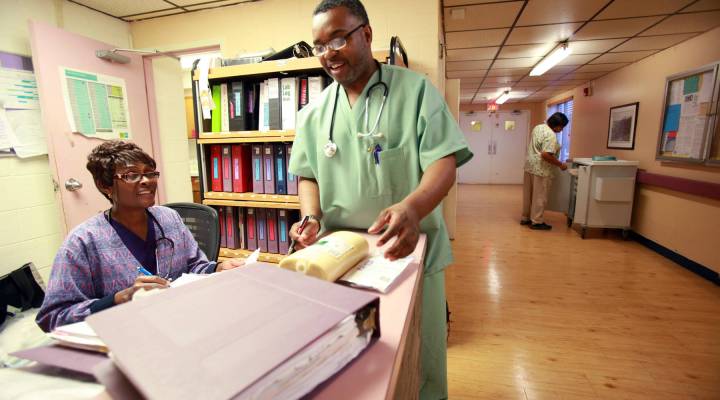
From heavy industry to intensive care

Four years ago this month the investment bank Bear Stearns collapsed. Two years ago this month the Dow Jones Industrial Average hovered around 6,500. We’ve weathered a global financial crisis, a deep recession, millions upon millions of job losses, foreclosures, ponzi schemes, downgrades and debt ceilings. It has been, in a word, “wrenching.”
But now we’re turning to another word. One on everyone’s mind last month because of a Superbowl ad starring Clint Eastwood about Detroit, Michigan’s “comeback.”
While the numbers are starting to look better, every survivor of the Great Recession has a tale to tell of spiraling downward and the efforts they’ve made to rebound. We start, appropriately enough, with two survivors in Detroit. They are Timothy Hank, 32, and Kurt Edwards, 49. Hank worked for Ford, making axles for trucks for $25 per hour for nearly a decade, but when he saw the writing on the wall, he took a buyout offered to him to vacate his position.
“I just didn’t want to be in a position where they controlled my fate,” he told Tess Vigeland. “I figured I’d jump in and do something else.” Hank took the $15,000 per year Ford offered for four years to go to nursing school at Wayne State, where only a quarter of his fellow graduates were male. He now works in the critical care unit at Beaumont Hospital in Royal Oak, Mich.
Kurt Edwards came to the nursing profession after serving as a soldier and working in a warehouse worker. He would never have thought of going into the caring professions were it not for a girlfriend’s suggestion. “I’m not going to nursing school!” was Edwards’ original reaction to the idea. But he eventually came around. “It can’t be that hard if these women are doing it,” he jokes.
He scrimped and saved to put himself through nursing school, and graduated in 2010. He is now a licensed practical nurse working the graveyard shift at Sheffield Manor Nursing Home on the west side of Detroit.
He and Hank chose new careers wisely. Tess Vigeland reports that Michigan’s Department of Energy, Labor and Economic Growth estimate a shortage of 18,000 nurses in Michigan in the next three years.
For Edwards, his new job isn’t just a positive statistic indicating a recovery from an economic crisis. It’s something more personal than that. “I wake up every day and I’m very proud,” he told Tess. “I’m looking in the mirror, and I’m happy and proud, and I’m saying, ‘This turned out great.’”
There’s a lot happening in the world. Through it all, Marketplace is here for you.
You rely on Marketplace to break down the world’s events and tell you how it affects you in a fact-based, approachable way. We rely on your financial support to keep making that possible.
Your donation today powers the independent journalism that you rely on. For just $5/month, you can help sustain Marketplace so we can keep reporting on the things that matter to you.












